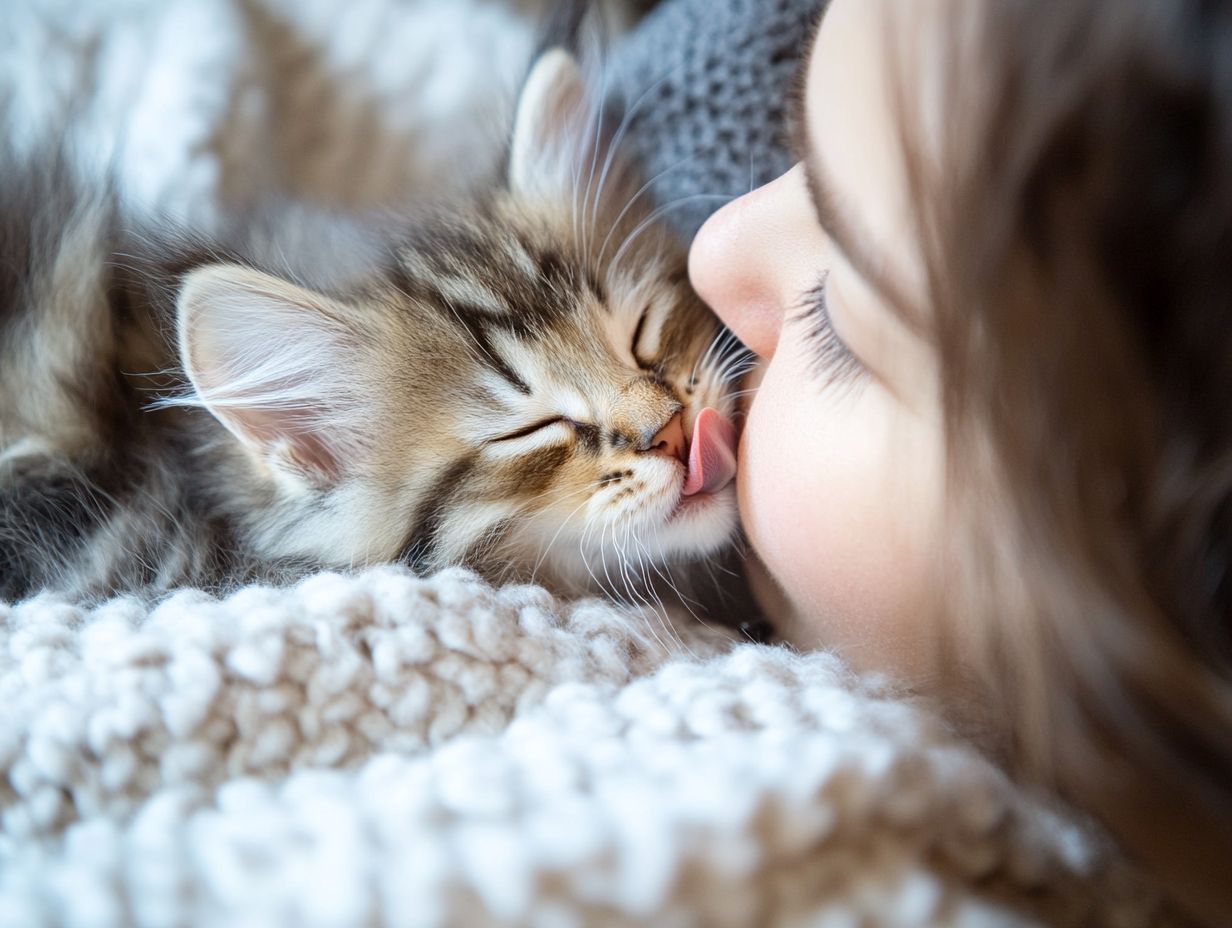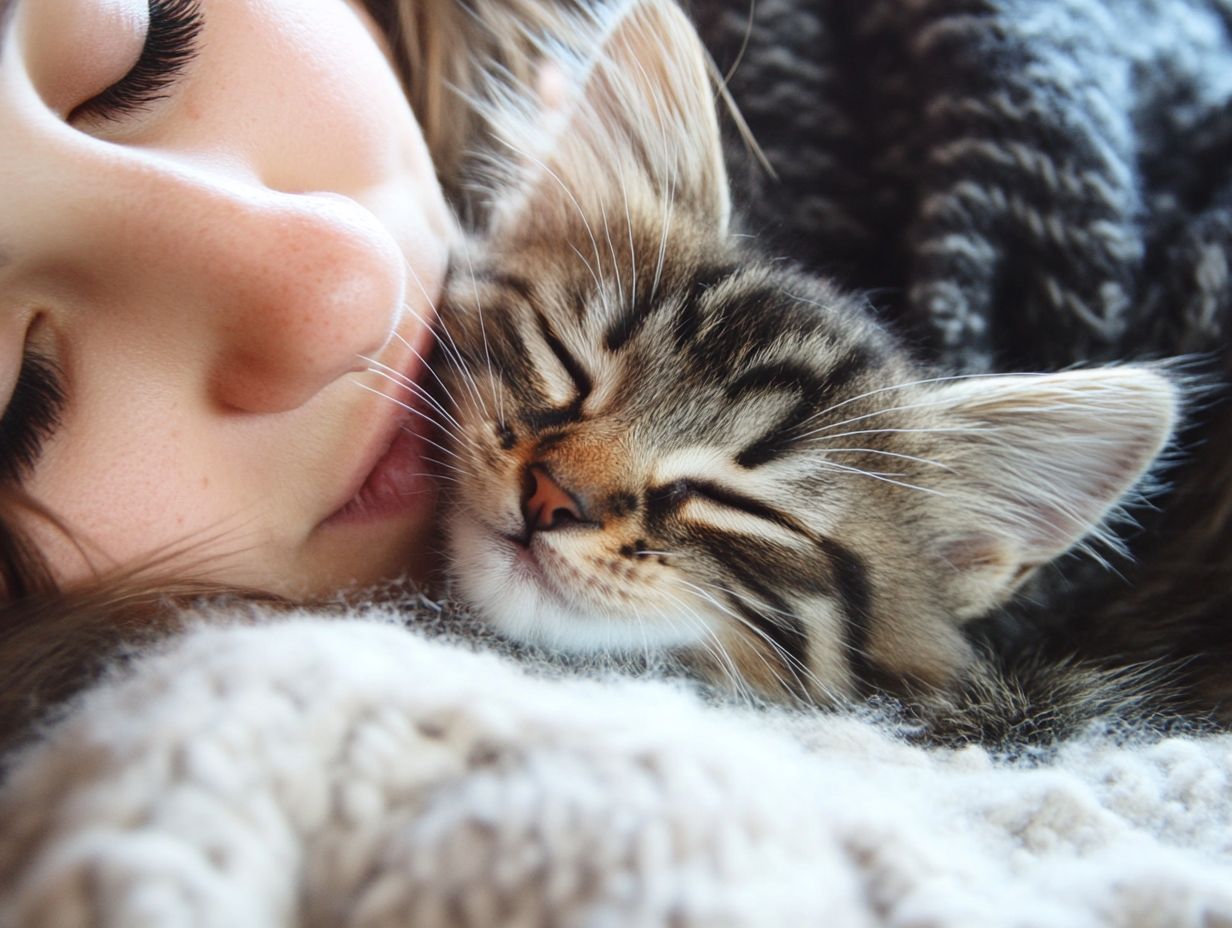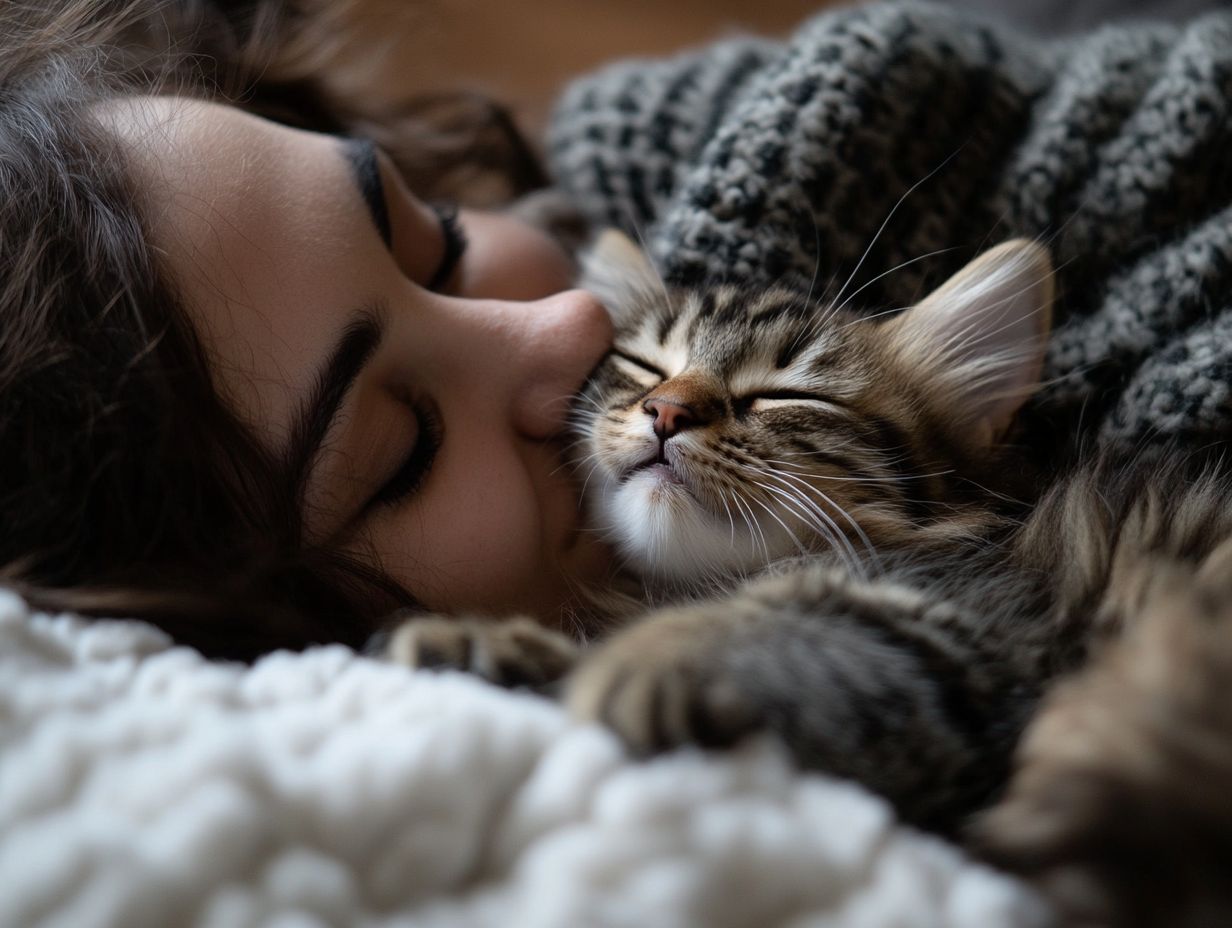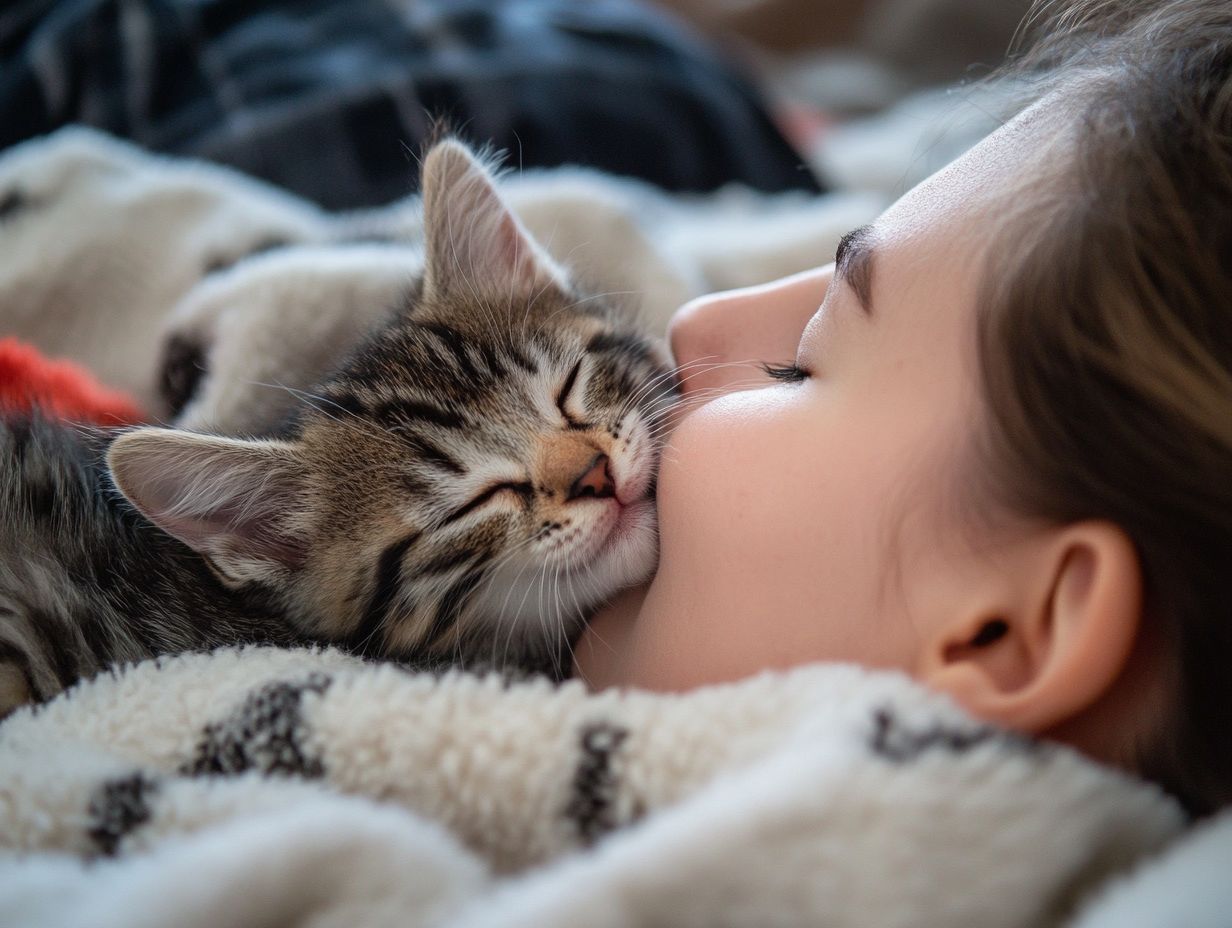Kittens are irresistibly cute, but their peculiar behaviors can leave us scratching our heads—especially when they start licking! Understanding the reasons behind this behavior is essential for nurturing a healthy relationship with your furry friend.
Whether it’s grooming themselves, showing affection, or just being playful, licking serves multiple purposes in a kitten’s world. This article explores why your kitten might be licking you (yes, even your nose!), what it means for their social interactions, and how to respond to this charming yet puzzling behavior.
Join us as we uncover the reasons behind this natural instinct!
Key Takeaways:

- Kittens lick as a form of grooming themselves and others.
- When a kitten licks your nose, it can be a sign of affection and acceptance.
- It is normal for kittens to lick their owners’ noses, as it is a natural behavior for them to show love and bond with their humans.
- Individual differences, such as breed and past experiences, affect licking behavior.
Why Do Kittens Lick?
Kittens lick for several reasons, including grooming, play, and bonding with their owners. This natural behavior helps keep their skin free of salt and debris, while also serving as a way for them to express love. Licking may also serve as a coping mechanism for stress or anxiety.
When owners reciprocate with affection, it strengthens their bond. Licking can also indicate that a kitten is seeking attention and desires love and interaction from its caregivers.
What is the Purpose of Licking in Kittens?
Licking in kittens serves two primary purposes: grooming and social bonding, both of which are essential for their development and their relationship with their owners. This instinctive behavior helps maintain the kitten’s physical health by keeping them free of dust and loose hair, while also contributing significantly to their emotional well-being.
Kittens lick as a form of self-soothing, and their mother’s licking provides reassurance. When kittens lick their owners, it fosters a bond of trust and affection, often mimicking the actions of their mothers and creating a safe environment for emotional development.
Age-Related Changes in Licking Behavior
Licking behaviors can differ greatly across developmental stages. Kittens may lick more frequently as they explore their environment, while adult cats may lick less often, focusing instead on interactions that reinforce their social bonds. Senior cats might lick for comfort or as a sign of health issues, necessitating observation from their owners.
Is Licking a Sign of Affection?
Yes, licking is one of the most prominent signs of affection in kittens and serves as a way for them to bond with their owners and other cats. This licking behavior mimics the actions of their mother during the first few weeks of life, helping to alleviate any fear they may have felt as newborns and reinforcing their feelings of love and care.
While licking is instinctual for kittens as they groom themselves and others, it also serves as a means to mark their territory and demonstrate trust in their surroundings. This small act, when repeated over time, can significantly contribute to building a bond of trust and companionship. For more insights, check out Why Does My Kitten Lick My Nose? The Cuteness Explained.
As the kitten grows closer to its family members, it may lick them to express affection and offer comfort.
Why Does My Kitten Lick My Nose?
Kittens lick noses as both a grooming behavior and a sign of affection, indicating that they view you as part of their family and territory.
This nose-licking behavior is also common among playful kittens, who explore their surroundings by licking and often seek attention from their owners in this manner.
Is My Kitten Trying to Groom Me?

Yes, when your kitten licks you, they are likely trying to groom you, which signifies their affection and demonstrates social bonding behaviors. This natural instinct not only expresses love but also serves as a way for cats to solidify their social bonds, much like they would with other cats in their colony.
When they engage in this behavior with you, their human companion, it reflects their deep trust and acceptance of you. Grooming can be seen as an expression of feelings similar to how we express affection with our loved ones, highlighting that animals have their own forms of emotional expression and communication.
Recognizing this interaction can transform an act of communication into a profoundly emotional experience that strengthens your bond over time.
What Does It Mean When a Kitten Licks Your Nose?
It’s important to observe your kitten’s body language while they lick. If their body is relaxed, they are likely expressing affection. However, if they appear tense or anxious, excessive licking might indicate stress or discomfort. In such cases, consider consulting a veterinary professional for guidance.
Managing Licking Behavior
In multi-cat households, managing licking behavior may require attention to ensure that each cat receives adequate affection and attention. Introducing new kittens should be done gradually to minimize jealousy and establish a comfortable environment.
If you notice excessive licking, consider incorporating positive reinforcement techniques to encourage desirable behaviors. Avoid punishment, as it can lead to anxiety or fear in cats.
To address potential underlying issues, it’s essential to consult a veterinarian or animal behaviorist when licking becomes excessive or unusual.
Conclusion
Understanding the reasons behind licking behavior can enhance the bond between you and your kitten. By recognizing the significance of licking, you can provide a nurturing environment that promotes emotional well-being and strengthens your relationship.
When a kitten licks your nose, it is typically a sign of communication that signals trust and comfort, reflecting their instinctual behaviors rather than human-like interpretations of affection. This behavior is a natural instinct that promotes social bonding. Licking serves as a form of communication, expressing trust and comfort within your relationship.
By engaging in this behavior, the kitten not only taps into its instincts but also deepens its emotional connection with you. This action mirrors the love and care they receive from their mother and siblings, reinforcing the idea that they consider you part of their family. Factors such as breed, genetics, and early socialization experiences can influence how a kitten expresses affection through licking.
Such affectionate behaviors play a vital role in strengthening the bond between pets and humans, reminding both parties of the joys that come with family. According to a study published in Journal of Feline Medicine and Surgery, licking is a crucial behavior for social bonding in cats.
Is It Normal for Kittens to Lick Their Owners’ Noses?
Yes, it is normal behavior for kittens to lick their owners’ noses. This licking is a sign of affection and social bonding. Kittens have natural instincts to seek comfort and form connections, and they often lick their owners’ noses, as well as other areas of their skin, to express their feelings.
According to animal behavior experts, such licking or nuzzling is an indication of trust and affection in kittens. This behavior makes them feel safe and cared for, similar to how they would interact with their mothers and littermates. Additionally, the act of licking helps them bond with their new families and showcases their playful and curious natures.
Understanding the reasons behind this licking behavior can help owners strengthen their relationships with their pets. While kittens often lick to bond socially, adult cats may use this behavior more selectively based on established relationships.
Other Reasons for Kitten Licking Behavior
Plus expressing affection, kittens lick for various other reasons, including grooming themselves, bonding socially, and relieving boredom. This licking behavior highlights the complexities of their behavioral patterns. To learn more about this behavior, check out Why Does My Kitten Lick My Nose? The Cuteness Explained.
What Does It Mean When a Kitten Licks Itself?
Kittens groom themselves by licking, a behavior that keeps their coats clean and healthy while promoting skin health. This instinctive action is not merely habitual; it is essential for their overall hygiene and helps minimize the buildup of dirt, parasites, and dead skin cells.
Grooming also allows kittens to spread natural oils throughout their fur, keeping it smooth, moisturized, and healthy. Additionally, licking serves as a way for kittens to calm and comfort themselves. If a kitten licks while purring and kneading, it typically indicates comfort and contentment.
By observing your kitten’s grooming patterns, you can monitor their health more closely, as excessive licking may indicate stress or skin issues. Engaging in environmental enrichment, such as providing safe spaces and climbing structures, can help reduce boredom-related licking.
Why Do Kittens Lick Other Animals?

Kittens lick other animals to groom them and establish social bonds, reflecting their affectionate nature and instinctive behavior. This grooming behavior is crucial for fostering strong relationships among pets, particularly in multi-pet households.
When a kitten licks another cat or dog, it not only keeps their fur clean but also builds trust and companionship, helping to alleviate stress and tension as it signifies acceptance and affection. While these grooming rituals can be adorable to observe, they also underscore the importance of social structures within the animal kingdom.
Engaging in this natural instinct enhances a pet’s emotional well-being and contributes to a harmonious environment, ultimately strengthening their bond with their human family.
Can Kittens Lick Out of Boredom?
Yes, kittens may lick out of boredom, as this behavior allows them to release energy and seek attention from their owners. When young cats find themselves in a calm environment with little to no stimulation, they may lick excessively as a response to this boredom.
This repetitive behavior can serve as both a distraction for the cats and a signal to their owners that they need more engagement. To help reduce this behavior, owners should provide young cats with a variety of stimulating toys, such as:
- interactive puzzles
- wand toys that require some involvement from the owner
Additionally, owners should be aware of changes in licking behavior, as excessive licking may indicate stress or anxiety. If licking becomes a problem, it may be advisable to seek veterinary advice to rule out medical issues, such as skin allergies or anxiety disorders.
For ongoing learning about feline behavior, consider exploring reputable books, websites, or courses to enhance your understanding of your pet’s needs and behaviors.
Additionally, incorporating regular playtime into their daily routines can offer both physical and mental stimulation, leading to happier and healthier cats who are less likely to engage in boredom-based behaviors. Kittens may lick their owners’ noses as a sign of affection and trust. According to research, licking is a common behavior among kittens that signifies affection.
Understanding your pet’s behavior and bonding with them through play and affection can create a fulfilling cat-human relationship.
How to Respond to Your Kitten’s Licking Behavior
Understanding the context of your kitten’s licking behavior is essential for determining how to respond, whether it involves encouraging their affectionate actions or correcting them. It’s important to recognize the physical, emotional, and environmental factors influencing licking behavior, such as stress or boredom.
Should You Let Your Kitten Lick You?
Allowing your kitten to lick you can reinforce their affectionate behavior, provided it does not become excessive. This gentle action indicates that they trust you and feel comfortable in your presence, which can enhance your bonding exercise with them. However, you should observe their body language and feline cues during interactions to respect cat communication and understand their needs better.
It’s essential to monitor the situation closely. When a kitten playfully licks you with their tongue, it often conveys love and playfulness. Be cautious of any sudden changes in the frequency of licking; while a few licks can be charming, a drastic increase may indicate territorial or territorial behavior and that the kitten is feeling stressed or anxious. Recognizing signs of stress or anxiety in kittens can help you understand their emotional state and its link to licking behavior.
Establishing boundaries is crucial for maintaining a healthy relationship. If the licking becomes excessive, redirecting your kitten’s attention to toys, a laser pen, or playtime can help restore a more appropriate level of affection. By observing your kitten’s behavior and comfort level, you can strengthen your bond and ensure they feel they belong without overwhelming either of you.
How to Train Your Kitten to Stop Licking
Training your kitten to reduce excessive licking behavior should focus on addressing the underlying causes and encouraging healthy interactions. While the techniques outlined in this article can offer guidance, achieving success will require patience and consistency from the owner. Keep in mind that age-related differences in behavior modification techniques are important—what works for a kitten may differ for adult or senior cats.
Here are some effective strategies to incorporate into the training process:
- Positive Reinforcement: Owners should encourage their kittens to lick less or stop licking altogether. This can be achieved by providing praise and treats when the kitten refrains from licking or minimizes the behavior. Additionally, if the kitten shows signs of wanting to lick but chooses to engage in another activity instead, the owner can reward this decision with praise or treats. For example, if the kitten is licking its paw but is offered a toy to play with, the owner should praise or reward the kitten if it licks less or stops licking entirely.
- Providing Alternative Activities: Cat owners can help their kittens lick less by offering alternative activities. Providing toys for play or spending time engaging with the kitten can effectively distract it from licking and reinforce the positive behavior of licking less or not at all. Consider environmental enrichment activities like puzzle feeders or interactive toys to prevent boredom.
- Understanding Triggers: It is important for owners to identify the underlying causes of the licking behavior, which may include stress or boredom. By observing their kittens closely and noting specific situations that lead to licking, owners may find the training process becomes easier. Gradual desensitization can also be beneficial; this involves exposing the kitten to the stimulus that triggers licking in a controlled manner so that the kitten learns to associate the stimulus with positive experiences rather than stress.
- Establishing Routines: Regular feeding, grooming behavior, and playtime can help reduce stress and anxiety that may contribute to licking. Owners should establish consistent routines for these activities. By following the same daily patterns for feeding, grooming, and play, kittens will learn that licking less or not at all is expected and desirable behavior. Structured play and positive engagement can help reduce excessive licking behaviors.
Frequently Asked Questions

Why does my kitten lick my nose?
Kittens lick their owners’ noses as a sign of affection and bonding. It is their way of showing love and trust towards their human. However, it’s essential to recognize individual cat differences and observe any sudden changes in behavior.
Is it safe for my kitten to lick my nose?
Yes, it is generally safe for your kitten to lick your nose. Kittens exhibit a natural instinct to groom themselves and others, and their saliva contains antibacterial properties, making it cleaner than many other animals. According to veterinary sources, feline saliva plays a role in self-grooming and bonding (Source: “Veterinary Textbook of Small Animal Medicine”).
Does my kitten licking my nose mean they are hungry?
No, your kitten’s licking behavior is not directly related to their hunger. While this action can be a form of affection, it may also stem from other behavioral needs, such as comfort or stress relief. For a more comprehensive perspective, consulting veterinary behavioral guides can be beneficial.
How can I discourage my kitten from licking my nose?
If you find your kitten’s nose licking behavior uncomfortable, you can gently redirect their attention by offering them a toy or some treats. Positive reinforcement techniques, such as rewarding them for engaging with a toy, are more effective than punishment, which can harm a cat’s emotional well-being and lead to anxiety.
Will my kitten outgrow the nose licking behavior?
Most kittens will eventually outgrow the nose licking behavior as they mature and become more independent. However, behaviors can vary significantly based on a cat’s personality and environment at different developmental stages (kitten, adult, senior). Some cats may continue this behavior as a way of showing affection toward their owners.
What other reasons might my kitten have for licking my nose?
In addition to showing affection, your kitten may also lick your nose as a way of exploring and familiarizing themselves with your scent. It’s important to observe your kitten’s body language during this behavior to understand their emotional state. They may also lick as a way to communicate and request attention or playtime.
Environmental enrichment and health monitoring
To help redirect licking behavior, consider providing environmental enrichment. Safe toys like feather wands, interactive puzzle feeders, and scratching posts can engage your kitten. Stimulating environments can reduce stress and promote healthier behaviors. Additionally, monitor your kitten for any signs of excessive licking that may indicate stress or anxiety, and consult a veterinarian if you notice any concerning behaviors.